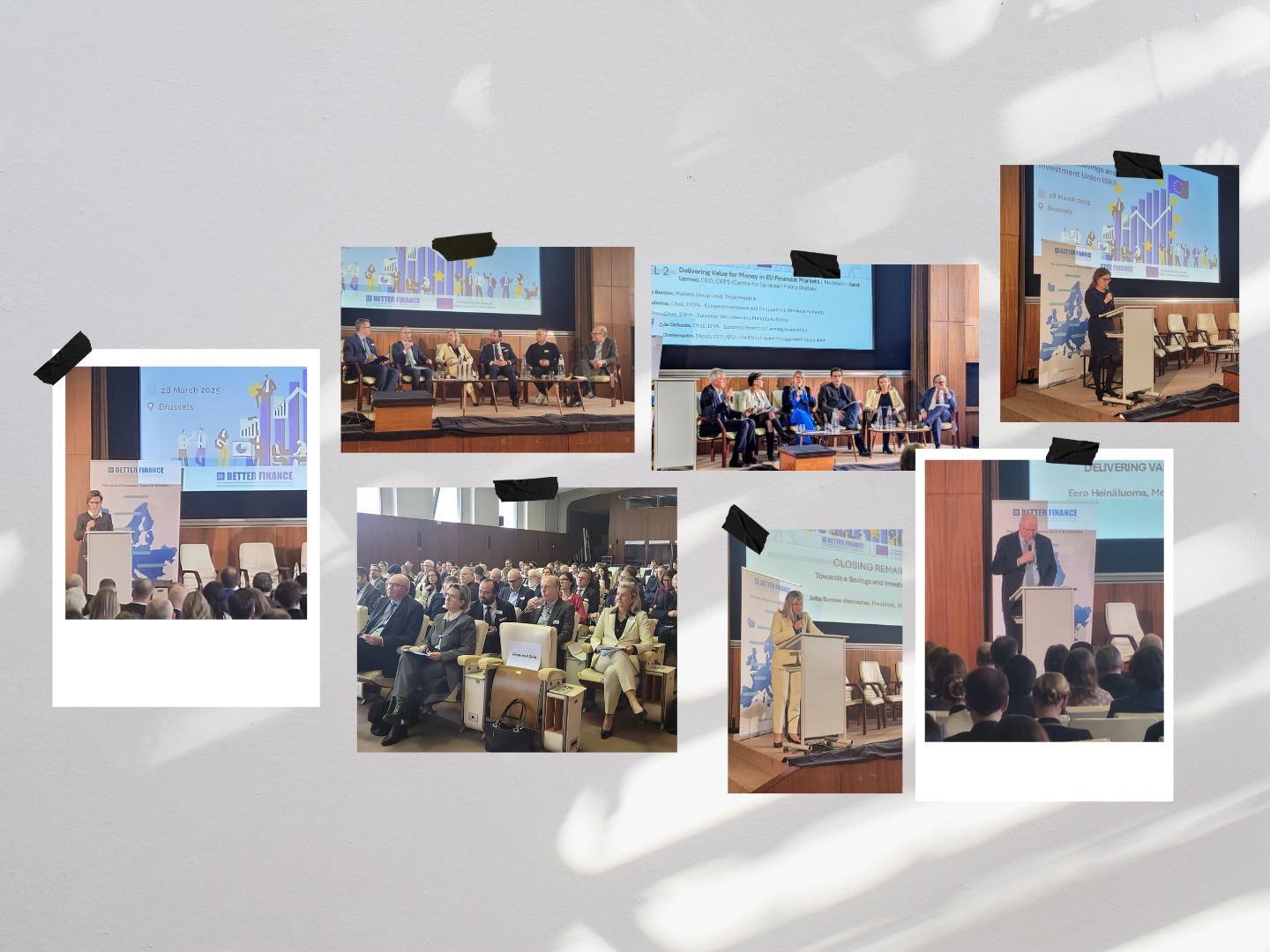
The BETTER FINANCE conference “Towards a Savings and Investment Union” brought together high-level policymakers, industry leaders, consumer advocates, and financial experts to address one of the European Union’s most pressing challenges: unlocking the €10 trillion in household savings currently held in low-yield bank deposits and reorienting them towards productive investments that support long-term growth, pension adequacy, and EU competitiveness.
Aleksandra Mączyńska, Managing Director at BETTER FINANCE, opened the conference with a strong call to action, underlining that the current financial ecosystem has failed retail investors through low returns, opaque product structures, high fees, and excessive complexity. These shortcomings have eroded trust and discouraged participation. However, she emphasised that the EU should leverage the momentum of the European Commission’s recent communication to deploy impactful tools such as simplified PEPPs, auto-enrolment mechanisms, and a potential savings and investment union.
The institutional commitment to better retail investor participation
The conference was followed by a keynote speech by Maria Luís Albuquerque, European Commissioner for Financial Services and the Savings and Investments Union. In her speech, Commissioner Albuquerque reaffirmed the European Commission’s commitment to empowering retail investors and unlocking their potential as key participants in deepening EU capital markets. She emphasised that the Retail Investment Strategy and Savings and Investment Union (SIU) are the central pillars to restore trust and deliver value for money. The Commissioner announced forthcoming measures to improve access to investment products, enhance pension outcomes through auto-enrolment and transparency tools, promote financial literacy, and propose a European blueprint for savings and investment accounts.
Building a true savings and investment union
The first panel of the day, moderated by Jella Benner-Heinacher, President of BETTER FINANCE, featured a dynamic exchange on building a true European Savings and Investment Union (SIU), with key contributions from experts across sectors.
During his intervention, Ben Granjé, Chairman of the Belgian Investors Association (VFB), emphasised that retail investors remain underrepresented and misunderstood. As a necessary change he urged better financial education, regulatory simplification, and cultural shifts in how investors are perceived. Also present on the panel was Nikolaj Kosakewitsch, President of Nasdaq Copenhagen, who called on national parliaments to act on the Commission’s proposals, as he noted there is an urgent need to activate pension and retail capital to fund Europe’s growth, including in strategic areas like defence.
Florian Prucker, Founder and Co-CEO of Scalable Capital and Sebastian Külps, head of Business Development, Germany & Northern Europe at Vanguard Europe, highlighted structural barriers, including fragmented taxation and high investment costs, calling for harmonised frameworks and reduced market entry costs.
Representing the European Commission, Andrea Beltramello, Head of Unit for the Capital Markets Union at DG FISMA, outlined the Commission’s plan to develop a blueprint for savings and investment accounts and stressed that retail investors are central to all SIU initiatives. The panel also addressed the role of financial literacy, with both Prucker and Külps advocating for “learning by doing,” particularly among younger investors engaging through digital platforms.
Reform for the people
In a keynote intervention, MEP Eero Heinäluoma praised BETTER FINANCE and other consumer advocacy groups for amplifying the voice of ordinary citizens in financial policymaking. He strongly criticised the fragmented state of the EU’s internal market for financial services, pointing out the high cost of retail investment products—often exacerbated by inducements—and calling for simplified, consumer-focused regulation.
Heinäluoma made a passionate plea for structural reform and cultural change—placing retail investors at the centre of an inclusive, resilient, and citizen-focused financial system.
Value for money and retail confidence
Moderated by Karel Lannoo, CEO of the Centre for European Policy Studies (CEPS), the second panel examined the practical and supervisory dimensions of ensuring “value for money” for retail clients. Petra Hielkema, chair of the European Insurance and Occupational Pensions Authority (EIOPA), and Verena Ross, chair of the European Securities and Markets Authority (ESMA), aligned on the importance of conduct supervision and targeted product governance. Specifically, Hielkema highlighted the need for better transparency and after-sale services, stressing that conduct supervision is crucial to identifying and remedying poor products. Similarly, Ross echoed the views of Hielkema, while also mentioning that ESMA continuously works with national supervisors to improve product governance and intervene when necessary.
Prof. Emanuele Carluccio from the European Financial Planning Association underscored the importance of advisor training, especially in ESG and MiFID contexts, to ensure responsible intermediation. At the same time, Delphine de Chaisemartin, Deputy CEO at the French Asset Management Association (AFG) defended the asset management industry’s client-centred approach while calling for more nuanced fee comparisons.
Matthias Baccino, Markets Group Lead at Trade Republic brought a fresh perspective, describing how Gen Z investors, driven by fear of a weaker welfare state, are seeking control and simplicity in their investments. He stressed that young investors value transparency, digital simplicity, and low-cost options. However, he warned that market fragmentation risks driving the young generation of retail investors to non-EU platforms.
A unified vision forward
Across all sessions, a common theme emerged: the need for transparency, simplicity, supervisory convergence, and strong investor protections as preconditions for deepening EU capital markets. With the right regulatory instruments, cultural adjustments, and stakeholder cooperation, the European Union can transform idle household savings into a powerful engine for sustainable investment and economic resilience.
As highlighted throughout the conference, the time for incremental steps is over. What is now required is an ambitious, collective push towards a genuine Savings and Investment Union—one that delivers for European citizens, supports strategic autonomy, and reinforces the Union’s global competitiveness.
